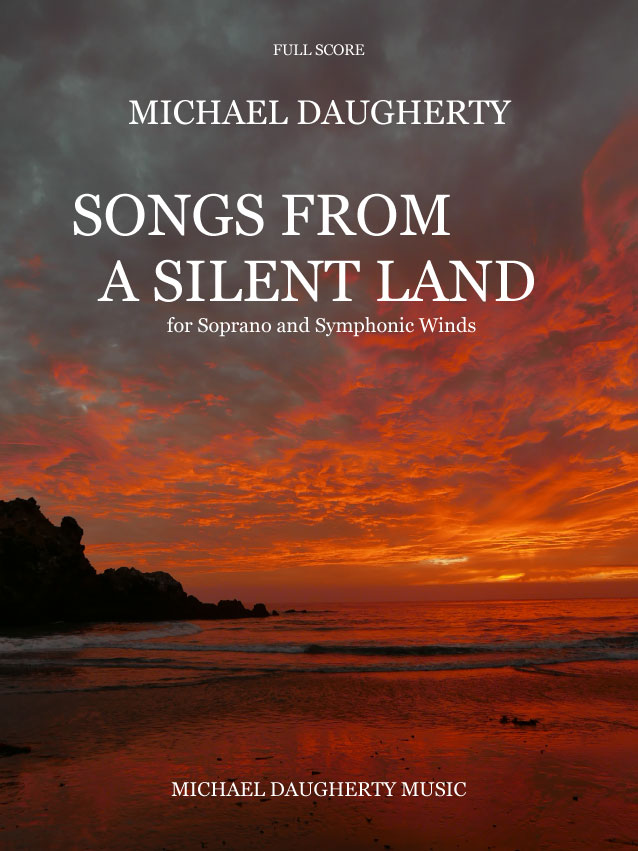Songs from a Silent Land
for soprano and symphonic winds (2019)
Songs from a Silent Land (2019) for soprano and symphonic winds is a 16-minute song cycle for soprano and chamber winds.
Publisher: Michael Daugherty Music
Duration: 16 minutes
World Premiere: Louisiana State University Wind Ensemble, conducted by Damon Talley, with Hila Plitmann, soprano at the College Band Directors National Association Convention, Arizona State University, Tempe, Arizona on February 20, 2019.
Instrumentation:
(one player per part)
Piccolo / Alto Flute
Flute
Oboe
English Horn
Bb Clarinet
Bb Bass Clarinet
Bassoon
Contrabassoon
2 F Horns
2 C Trumpets (mutes: straight metal, cup mute, harmon mute/stem out)
Soprano Solo
(If performed in a large concert hall, amplification recommended)
Harp
Percussion (two players):
1. Vibraphone, Glockenspiel, Xylophone
2. Triangle (mounted), Vibraslap (mounted), Claves, Chimes, Castanets (mounted), Kick Drum, Wind Chimes, Crotales (one octave, lower octave), Tambourine (small), Glockenspiel (shared with Percussion 1)
Contrabass

COMPOSER’S NOTE:
Inspired by the poetry of Emily Dickinson (1830-1866) and Christina Rossetti (1830-1894), Songs from a Silent Land is comprised of three songs, reflecting on this world and the possibility of a next world.
In the first song, I incorporate two of Dickinson’s poems that reflect on our experiences of life and nature in the world around us. The song begins with Water is Taught by Thirst (1859). Just as the poem proclaims that life’s experiences and desires are defined by absence, I interrupt the music after each line of verse to enhance our appreciation of sound through silence. The rhythms in the vocal line for the first poem are transferred to the instrumental ensemble in the second poem, to accompany the soprano’s soulful rendition of I Think That the Root of the Wind is Water (1873).
For the stirring second movement, I set the words of Rossetti’s De Profundis (1876). Her poem laments the impossibility of reaching heaven during one’s lifetime, while longing for the joy and beauty of heaven. The syncopated music for the first three quatrains is agitated, repeating the question: “Oh why is heaven built so far, / Oh why is earth set so remote?” By contrast the music for the final quatrain is serene and uplifting: “I strain my heart, I stretch my hands, / And catch at hope.”
My song cycle concludes with a bittersweet musical rendering of Rossetti’s sonnet, Remember (1862). I have composed wistful and melancholy music for the first two quatrains (or octave), where Rossetti encourages her beloved: “Remember me when I am gone away / Gone far away into the silent land.” But with the word “Yet” at the start of the final six lines (or sestet), Rossetti changes her mind, conceding that it might be better to “forget and smile” than to “remember and be sad.” To dramatize this turn (or volta) in the sonnet, the music becomes brooding and darkly beautiful. The soprano’s ascending line at the end of the song leaves us suspended between remembering and forgetting, just like Rossetti’s paradoxical poem.
Songs from a Silent Land (2019) was commissioned by Damon Talley and Louisiana State University with the following consortium of universities and conductors: Auburn University, Rick Good; Baylor University, Eric Wilson; Clemson University, Mark Spede; Columbus State University, Jamie Nix; Florida State University, Richard Clary and Patrick Dunnigan; Illinois State University, Anthony Marinello; Indiana University, Rodney Dorsey; Kennesaw State University, David Kehler; Lawrence Conservatory, Andrew Mast; Middle Tennessee State University, Reed Thomas; Oklahoma State University, Joseph Missal; Stephen F. Austin, David Campo; University of Arkansas, Chris Knighten; University of California Los Angles, Travis Cross; University of Central Florida, Scott Lubaroff; University of Florida, David Waybright; University of Kentucky, Cody Birdwell; University of Miami, Robert Carnochan; University of Michigan, Michael Haithcock; University of Minnesota, Emily Threinen; University of Missouri Kansas City, Steven Davis; University of Oklahoma, Shanti Simon; University of Southern California, H. Robert Reynolds; University of Tennessee, Don Ryder; University of Texas at Austin, Jerry Junkin; Western Michigan University, Scott Boerma and West Virginia University, Scott Tobias.
-Michael Daugherty
TEXT
I. Water is Taught by Thirst (1859)
Emily Dickinson (1830-1866; American)
Water, is taught by thirst.
Land—by the Oceans passed.
Transport—by throe—
Peace—by its battles told—
Love, by Memorial Mold—
Birds, by the Snow.
I Think That the Root of the Wind is Water (1873)
Emily Dickinson (1830-1866; American)
I think that the Root of the Wind is Water—
It would not sound so deep
Were it a Firmamental Product—
Airs no Oceans keep —
Mediterranean intonations—
To a Current’s ear—
There is a maritime conviction
In the Atmosphere—
II. De Profundis (1862)
Christina Rossetti (1830-1894; English)
Oh why is heaven built so far,
Oh why is earth set so remote?
I cannot reach the nearest star
That hangs afloat.
I would not care to reach the moon,
One round monotonous of change;
Yet even she repeats her tune
Beyond my range.
I never watch the scatter’d fire
Of stars, or sun’s far-trailing train,
But all my heart is one desire,
And all in vain:
For I am bound with fleshly bands,
Joy, beauty, lie beyond my scope;
I strain my heart, I stretch my hands,
And catch at hope.
III. Remember (1876)
Christina Rossetti (1830-1894; English)
Remember me when I am gone away,
Gone far away into the silent land;
When you can no more hold me by the hand,
Nor I half turn to go yet turning stay.
Remember me when no more day by day
You tell me of our future that you plann’d:
Only remember me; you understand
It will be late to counsel then or pray.
Yet if you should forget me for a while
And afterwards remember, do not grieve:
For if the darkness and corruption leave
A vestige of the thoughts that once I had,
Better by far you should forget and smile
Than that you should remember and be sad.




